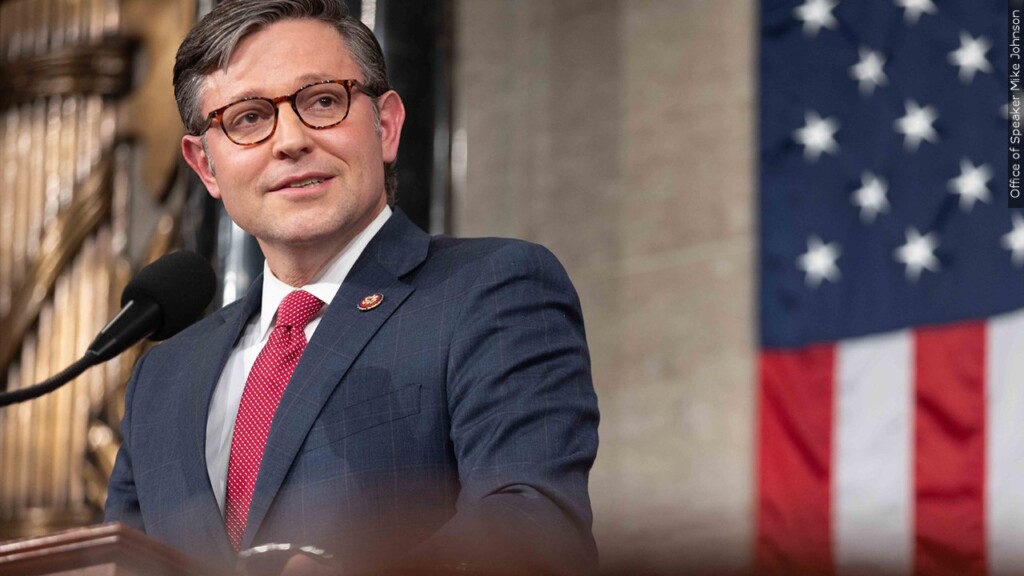Speaker Johnson says it’s up to Democrats to ‘stop the madness’ on shutdown’s sixth day

WASHINGTON (AP) — Lawmakers provided few public signs of meaningful negotiations to break an impasse on reopening the federal government as the shutdown entered its sixth day. House Speaker Mike Johnson said “there’s nothing for us to negotiate” while House Democratic leader Hakeem Jeffries declared the “time is now” to work out a deal on health care.
Johnson, R-La., told reporters on Monday that they could stop asking why he wasn’t negotiating an end to the impasse and that it was up to a handful of Democrats to “stop the madness” and pass a stopgap spending bill that had earlier passed the House.
“We did the job to keep the government open, and now it’s on the Senate Democrats,” Johnson said.
The House is not expected to be in session this week, focusing attention on the Senate to take the lead on any deal in the Republican-led Congress. Yet even with House lawmakers away, the Republican and Democratic leaders have been holding almost daily briefings as they frame their arguments and seek to shift blame for the shutdown.
Democrats are insisting on renewing subsidies to cover health insurance costs for millions of households, while President Donald Trump wants to preserve existing spending levels for now as he believes that Democrats will have to fold because of the jobs and federal infrastructure and energy projects being put at risk.
Jeffries said in an NBC “The Today Show” interview Monday that notices have already started to go out to Americans enrolled in health insurance exchanges established through the Affordable Care Act, with those notices showing dramatic increases in premiums next year.
“That’s what people are facing right now, which is why we need to address it,” Jeffries said.
Turmoil for the economy
The stalemate comes at a moment of troubling economic uncertainty. While the U.S. economy has continued to grow this year, hiring has slowed and inflation remains elevated as the Republican president’s import taxes have created a series of disruptions for businesses and hurt confidence in his leadership. At the same time, there is a recognition that the nearly $2 trillion annual budget deficit is financially unsustainable.
The Trump administration sees the shutdown as an opening to wield greater power over the budget, with multiple officials saying they will save money as workers are furloughed by imposing permanent job cuts on thousands of government workers, a tactic that has never been used before.
Trump had seemingly suggested Sunday night that layoffs were already taking place, but White House press secretary Karoline Leavitt said Trump was talking about furloughs. Under a furlough, workers cannot report to work, but they will return to their job and get paid retroactively after the shutdown ends. She said layoffs were still planned if the shutdown continues.
The talk of layoffs has escalated an already tense situation in which Washington lawmakers have struggled to find common ground and build mutual trust. Leaders in both parties are betting that public sentiment has swung their way, putting pressure on the other side to cave.
Democrats say a promise is not enough
Even though it would be Trump’s choice to cut jobs, Republicans are putting the blame on the Democrats because of the shutdown.
Democratic Sen. Adam Schiff of California defended his party’s stance on the shutdown, saying the possible increase in health care costs for millions of Americans would make insurance unaffordable. He called it a “crisis.”
But Schiff also noted that the Trump administration has stopped congressionally approved spending. That essentially undermines the value of Democrats trying to seek compromises on the budget since the administration could block the spending of money from any deal. The Trump administration sent Congress roughly $4.9 billion in what are called pocket rescissions on foreign aid, a process that meant the money was withheld without time for Congress to weigh in before the previous fiscal year ended last month.
“We need both to address the health care crisis, and we need some written assurance in the law — I won’t take a promise — that they’re not going to renege on any deal we make,” Schiff said.
But a deal appears a long way off. The two parties do not appear to be having productive conversations with each other in private, even as Republicans insist they are in conversation with their Democratic colleagues.
In the Senate, a stubborn stalemate
The Senate has voted multiple times on the same legislation to reopen the government, only to have it fail each time.
The last vote came on Friday, as Republican bill that would reopen the government failed to notch the necessary 60 votes to end a filibuster in the 100-member chamber.
Senate Majority Leader John Thune of South Dakota said Sunday that the shutdown on discretionary spending, the furloughing of federal workers and requirements that other federal employees work without pay will continue so long as Democrats vote no.
“They’ll get another chance on Monday to vote again,” Thune said. “And I’m hoping that some of them have a change of heart.”




